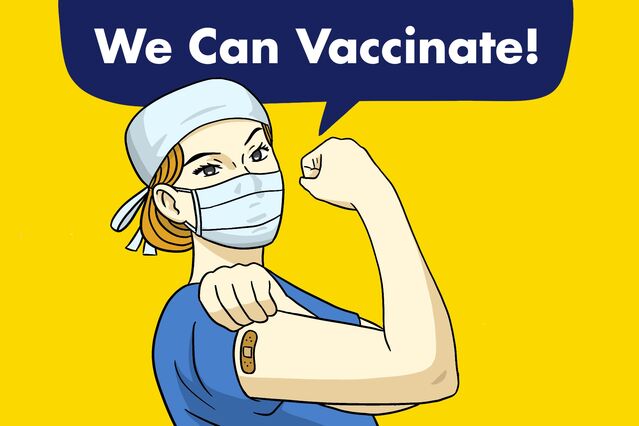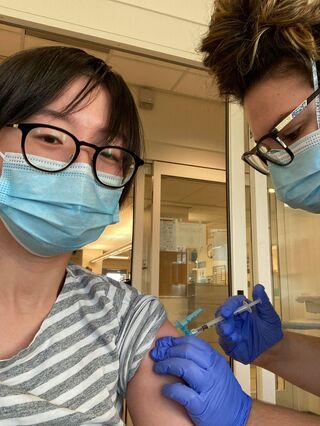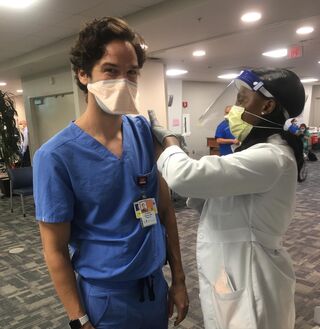Coronavirus Disease 2019
The Rise of COVID-19 Vaccine Selfies on Social Media
Doctors are posting vaccine selfies on Instagram. Eventually, you should too.
Posted December 23, 2020 Reviewed by Matt Huston


When my hospital finally made the Pfizer-BioNTech COVID-19 vaccine available to its front-line staff, I signed up for the next available appointment. When the time came, I rolled up my sleeve and—almost as an afterthought—took a selfie of the moment that the syringe tip came up flush against my skin. I was so excited about receiving the vaccine that I barely noticed the needle sting.
I posted my photo—capturing the moment I'd been waiting for since the beginning of the pandemic—on Facebook and the family group chat. Then the questions started streaming in. "How did it feel?" "Have you developed X-ray vision yet?" The next day, I received two follow-up messages asking me whether I experienced any additional side effects. I responded that my arm was a little sore, as expected, but that I was none worse for the wear.
Over the weekend, I noticed more and more physicians, nurses, and other front-line health care workers posting photos of their vaccinations on Facebook, Twitter, and Instagram. A few posters encouraged both the curious and the skeptical to ask questions about the experience.
Some institutions, such as Northwestern Medicine, mobilized their official public relations department, leaning heavily into social media platforms to share stories of their healthcare workers being vaccinated.
If a picture is worth a thousand words, then the thousands of vaccination photos amplified the same basic message: We're on the front lines, we're getting the novel vaccination to protect ourselves, our loved ones, and our patients; will you?
In August 2020, only a month after the BioNTech and Pfizer vaccine trial had begun, the data science consulting company Civis Analysis ran a focus group analyzing how different messages impact an individual's willingness to get vaccinated against COVID-19. Nearly 4,000 participants were divided into six groups, including one control group. Five groups received a message that underscored the importance of receiving a vaccine but emphasized a different reason for doing so.
For example, the "safety message" explained that the shortened timeline for vaccine development would not jeopardize the vaccine's safety or efficacy, whereas the "economic message" emphasized how widespread vaccinations would put the country on a faster track to economic recovery.
However, the most effective message for raising a participant's willingness to vaccinate was the "personal message," which shared the story of a young American who died from COVID-19. This message increased the reported likelihood that an individual would receive a hypothetical vaccine by 5 percent, compared to the control group.
"Stories are what makes us human," said Trishna Narula, M.P.H., a Population Health Fellow at the Harris Health System in Houston, Texas, and a medical student at the Stanford University School of Medicine. "Stories are also tied to emotions. Folks have—understandably—become overwhelmed, fatigued, and numb to the numbers and news nowadays. I see it as our duty in healthcare, medicine, and science—and even as ordinary citizens—to bring back the emotion, the humanity, the empathy, and most importantly, the hope."
Based on Civis Analytics's findings, Narula worked in conjunction with the California Medical Association and California Department of Public Health and healthcare social media influencers to come up with scripts that individuals could adapt, including the following:
I’ll be getting the COVID-19 vaccine in honor of [name] who didn’t make it/seriously suffered from COVID. This is for the more than 300,000 who’ve already passed away and didn’t live to see this moment. Who didn’t have this chance. No more lives should be tragically lost now that we can end this pandemic. This is our light at the end of the tunnel. #ThisIsOurShot.
But even without the direction of medical boards and associations, many other physicians and healthcare workers ended up coming to the same conclusion, that social media could be used to reassure and inform the public.

Jonathan Tijerina is a physician at the University of Miami Health System. He posted a photo of his vaccination on December 16th, mere days after the immunization received an emergency use authorization from the Food and Drug Administration.
A part of his post read, "As a Type 1 Diabetic and thus someone at increased risk for very poor outcomes should I become infected with Covid, I will sleep much easier and approach my role as a healthcare provider during this pandemic with a renewed confidence." His post garnered more than 400 likes on Instagram.
Tijerina explained that his post was motivated by some of his discussions about the COVID-19 vaccine with his family and friends back home in east Texas.
"I'm from a very rural part of the state," says Tijerina. "And I gathered from my conversations that there was a lot of hesitancy, distrust, and misinformation about the vaccine floating around. So by posting about being excited to get vaccinated, I hoped I could encourage people to consider it and make myself available personally to answer questions, address concerns, etc."
Healthcare workers across the country have been working non-stop throughout the pandemic. However, they have at least one more crucial role left: to educate the public regarding the safety and efficacy of the new COVID-19 vaccines by sharing their personal experiences.
"I totally understand that we as physicians and healthcare professionals are experiencing an incredibly trying period with taxing demands on our time, energy, and bandwidth," says Tijerina.
"However, I have a lot of hope that we can meet people where they are using social media."
Narula echoed that sentiment. "Social media, as we know, is full of stories and so much misinformation. And we are seeing the impact that has on what people believe, how they behave, and the decisions they make. The only way to counteract that is to share even more stories about the truth that physicians, nurses, essential workers, public health practitioners, and scientists see every day."
References
Civis Analysis (2020). How to Talk about the COVID-19 Vaccine. https://www.civisanalytics.com/blog/healthcare/how-to-talk-about-the-co…




